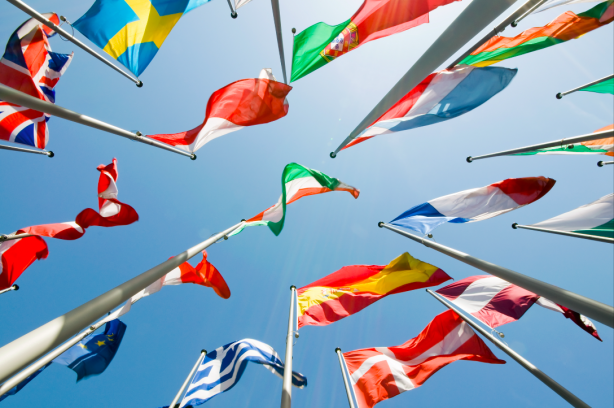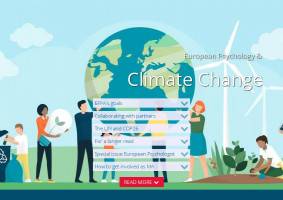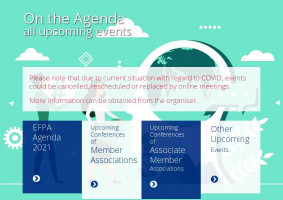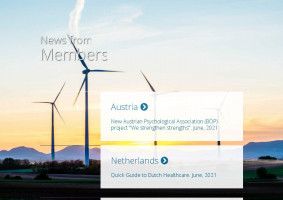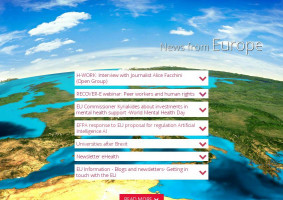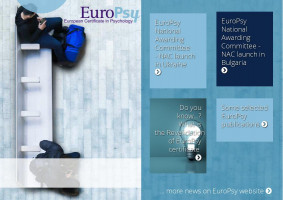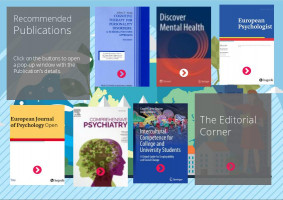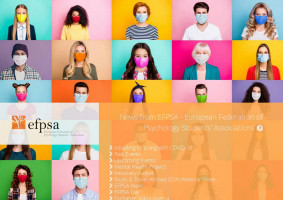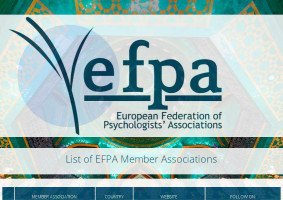READ MORE
EFPA News Magazine Interview Section
EFPA is one of the 14 partners of the EU funded project H-Work Multilevel interventions to promote mental health in SME’s and Public Workplaces.
With this interview section in the EFPA News Magazine, we aim to keep our member associations informed about the progress in the H-Work project and to provide insight into the role of the different partners of the consortium. These interviews with project partners will become a permanent section. We hope it makes for a pleasant and informative read.
Find here in this edition, Jolien Vandeneynde interview of Alice Facchini, Journalist of the 'OPEN GROUP'.
Alice Facchini – Journalist of OPEN GROUP
1. What is the role of your organization in the H-Work Project?
In the H-WORK project, Open Group is the leader of the WP7 “PROMOTE: Communication & dissemination, policy briefs and recommendations”. Within WP7, Open Group is responsible for the communication and dissemination of H-WORK goals and coordinates this task across the consortium and throughout the whole project. To accomplish this objective, Open Group defined the main guidelines for a high impact communication strategy and works in close collaboration with all the partners of the Consortium.
2. What is your role within the project?
I am the responsible of the communication strategy of the H-WORK project – in particular, I work on the contents for the H-WORK website and newsletter, for the social media pages (Twitter and LinkedIn) and for the graphic materials. In fact, all the H-WORK communication actions aim at connecting the project’s objectives and results to a wide audience using the promotional influence of websites, social media, press office activities, newsletters and all the other channels made available by all partners.
-
3. Can you present us your team?The Open Group team is composed by three people:
- Alice Facchini, journalist and responsible of the communication strategy of the H-WORK project;
- Alessandro Gabriele, coordinator of the communication agency Be Open, part of Open Group;
- Manfredi Liparoti, journalist and social media expert.
To read the full interview, fold out:
4. What is the impact of COVID on the work of your organization for the H-Work project?
Luckily, our work was not exaggeratedly impacted by the covid-19 emergency, because most of the activities are carried out remotely. What we were unable to do was to participate in person in conferences and meetings, which would have allowed us to get to know the other partners better and do team building activities.5. What has your team accomplished in the project so far?
First of all, Open Group contributed to build a solid project identity creating the H-WORK logo, that is used to strengthen the project consistency and to deliver clear messages to the audience. Then, we opened new communication channels: the H-WORK website, that is the main showcase of the projects; the H-WORK newsletter, that is sent every three months; the Twitter and LinkedIn pages. We have already published 20 news on the H-WORK website, we have already sent 3 newsletters with 120 direct recipients, and we have created a strong community, with 188 followers on Twitter and 233 on LinkedIn. Also, we produced promotional materials (print and digital version) and a video that promotes the H-WORK project explaining the setting, the EU call, the objectives, the birth of the Consortium and the challenges the project intends to tackle.6. What are you currently working on and what are the next steps?At the moment, we are working together with the partners of the Consortium to write other news to update the website and give an overview about how the project is progressing, focusing on the new Group 2 activities and on the reopening after the second lockdown. Also, we are writing the first periodic report for the European Commission.
7. What are currently the main obstacles for your work and for the project in general?In my opinion, now the main obstacle for the H-WORK project is to carry out the activities despite the closures and difficulties due to the Covid-19 pandemic. Fortunately, the partners found different solutions and are continuing to bring forward the project in an efficient and effective way.
8. What are your expectations regarding the outcomes of the project?Our main objective is to guarantee an effective communication of the project activities, outcomes and findings, recommendations and guidelines at local, national and EU level. We would like to create awareness and raise the visibility of the project and its objectives and ensure an extensive public coverage of the project and its findings. Also, the aim is to identify and thus encourage participation of all relevant stakeholders and the general public and set the ground for the sustainability and further exploitation of the project results.
8. How do you think your organization and EFPA can collaborate in the H-Work Project?Open Group and EFPA are collaborating in the H-WORK communication and dissemination strategy, supporting each other in producing communication materials and contributing to maximise the impact of the project.
This interview was taken in May 2021 by Jolien Vandeneynde.
Back to top
-
RECOVER-E Webinar on Human Rights and Peer Workers
On 14 October 2021 Recover-E hosted a webinar titled “Peer workers perspective: Human rights in mental health and the importance of the role of peer workers in mental health care”. The first part of the webinar was dedicated to diverse human rights issues, equity and equality in mental health.
We are delighted that two psychology representatives nominated by EFPA Board of Human Rights and Psychology: Polli Hagenaars, and Nora Sveaass, were speaking at the first part of the webinar, pointing out key issues on human rights and psychology in relation to mental health.Read more
We are delighted that two psychology representatives nominated by EFPA Board of Human Rights and Psychology: Polli Hagenaars, and Nora Sveaass, were speaking at the first part of the webinar, pointing out key issues on human rights and psychology in relation to mental health.
Polli Hagenaars in her presentation titled “A human rights based-and-oriented approach to mental health care” pointed out the good practices of a human rights-based approach, and shared the instruments that can be adapted to enhance mental health practices making them more human rights oriented.
Nora Sveaass in her presentation titled “Mental health consequences of sexual violence in conflict: how to support survivors?” attracted audience’s attention to the importance of this issue in light of refugees’ situation in Europe. She introduced a training manual on helping survivors of sexual violence in conflict.
Jan Wise, the Board member of European Psychiatric Association delivered a presentation talked about ways to remove systematic barriers in access and delivery of mental health services and exploration of peer workers to abide by human rights policies.
Aleksandar Tomcuk delivered a presentation on the EU Convention of human rights and exploration of diverse articles of the Convention.
Guadalupe Morales in her presentation on “Peer workers & the UN convention” talked about a paradigm shift in perception of people with diverse disabilities as people with human rights and demonstrated the curtail role of informal community care in mental health care services according to WHO, and hence, the place, involvement, motivation and training of peer workers in delivering such service.
The second part of the webinar introduced personal inspiring stories and insights from peer workers and professionals (psychologists, psychiatrists) representing community mental health teams (CMHT) from Bulgaria, Macedonia, Montenegro, which were established and are operating as a result of Recover-E project. For example, Stojan Bajraktarov stressed the importance of CMHT-spirit, system approach and sustainability of service, and the ways to motivate and remunerate peer-workers’ service.
The key messages from the webinar summarized by Laura Shields-Zeeman are:
1. A lot has been done in terms of human rights in mental health in recent years and there is still a big area for improvement.
2. People involved in CMHT need more power in practice.3. Peer workers play an important role in CMHT, research and service delivery.
4. The service has to be continuously improved.
5. Stigmatization and discrimination are still significant and they ways to reduce them shall be one of the priorities even after Recover-E project is over.
The webinar was attended by participants from all around the world not only from Europe, but also Africa and Australia.
Anna Leybina,
EFPA Executive Council liaison officer for RECOVER-EDownload the leaflet of the webinar here
The full webinar can be accessed here
Back to top
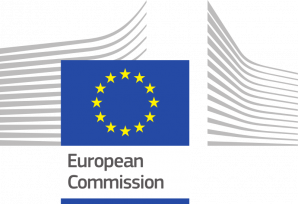

Ahead of the World Mental Health Day on 10 October 2021, Stella Kyriakides, Commissioner for Health and Food Safety, made the following statement:
We must work to build more resilient health systems, support those in need, and address the stigma surrounding mental health. The Recovery and Resilience Facility, at the heart of NextGenerationEU, will help the EU emerge stronger and more resilient from the pandemic.
I welcome the fact that several Member States will channel investment into mental health support and the modernisation of services as well as dedicated facilities as part of their recovery and resilience plans. We will also support 21 Member States as part of a three-year action to help tackle inequalities in service access and support service responsiveness. €7 million will be invested in projects to prevent depression, suicide and a health system reform that will support transformation of mental health services towards more person-centered, community based service provision…
Read the full statement here Back to top
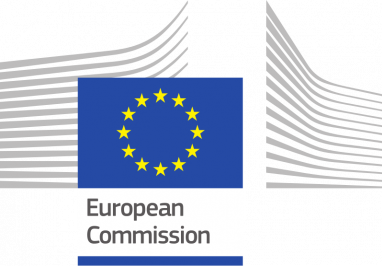

Proposal for Regulation of AI – EFPA Response
Artificial intelligence (AI) is a fast-evolving and strategic technology with tremendous opportunities. However, some of its uses pose specific significant risks to the application of various EU rules designed to protect fundamental rights, ensure safety and attribute liability.
The proposal for regulation aims ensure that AI is safe, lawful and in line with EU fundamental rights. The overall goal is to stimulate the uptake of trustworthy AI in the EU economy and beyond.
Feedback on the commission adoption plans closed 6th Aug 2021, with the Board of Assessment (BoA) providing a clear response of behalf of EFPA, urging the proposed areas of risk be proportionately categorised for of psychological assessment across Work, Education and Health domains.
Nigel Evans, Chair & Convenor of the Board subsequently took up the invitation to attend and contribute to a quickly arranged follow on high level conference on AI – from ambition to action organised by then Slovenian Presidency of European Council and European Commission.
-
On making connection to the EU AI Alliance, EFPA is now well placed to continue to provide input into the work of AI and EU policy-making.
Nigel Evans,
Chair of EFPA Board of AssessmentRead the EFPA response in full
European Federation of Psychologists’ Associations, Board of Assessment response to EU Regulatory Proposal on Artificial Intelligence
EFPA, The European Federation of Psychologists (established 1981) has the mission to develop and apply psychology for a positive impact on European society and beyond. EFPA publications are regularly consulted to inform EU policy and process. Now consisting of 38 European country associations, EFPA represents almost half of the world’s Psychologists whose members are required to observe professional standards. Specifically, EFPA Board of Assessment, whose members have led on this response, convenes regularly to encourage and advance best practices in testing and assessment.
EFPA thanks the EU Commission for their work thus far and agree the need for rules on Artificial Intelligence (AI) implementation to harness the full potential and benefits of this technology, while continuing to “put people first” in all instances. We applaud the proposal for requesting transparency and responsibility from organisations using AI.
However, we do have comments we hope are helpful as the regulations are debated:(1)
EFPA suggests, as have several other organisations, that the risk-based approach in Title II be revised to contain more levels than the current three now proposed. This will provide better differentiation between the types of industries and organisations using AI. We agree with many of the comments that the current High-risk category is too general and needs to be more granular, so that the precautions mandated, and regulations implemented, are appropriate for the various industries engaged with AI technology. For example, psychological, occupational, health, and educational assessments have for decades utilised automated scoring processes (to minimise human error) which could be considered as “AI” technology within the current definition. However, the interpretation of the results of this scoring should only be carried out by a professional and never left to mere digital automation.Assessments in the field of psychology are created by scientific professionals for use by practitioners in psychology and related disciplines. We are committed to continued steps to bring attention to the importance of responsible and ethical applications. We promote this through guidelines, the distribution of publications, and presentation at conferences to encourage the highest levels of academic and practice review.
(2)
EFPA encourages care in imposing regulations for documentation on AI systems, particularly those related to assessment. Fairness and privacy are central to our work, and we regularly conduct research to ensure our assessments are fair for all individuals, particularly when used for high-stakes decisions (such as clinical diagnosis, employment, or university acceptances). We strongly adhere to the rule that assessments should always be built on the foundations of rigorous science; and would never advocate that decisions be based on one type of assessment tool (whether using AI or other process).Psychologists increasingly use AI technology, especially where it is shown to be beneficial to accuracy and fairness during test administration and interpretation. In these cases, many safeguards are given including: clear records of all applied methodologies and data models, employing human oversight, and monitoring against bias to foster inclusion. The regulations need to consider and reflect the current oversight and standards for fairness and privacy already utilised by psychologists.
(3)
EFPA urges regulators to hold public discussions with organisations and associations that have taken the time to provide specific feedback. These discussions can be part of your presentation to the European Parliament and Council, as the information we have provided, for example, would be critical in understanding the need for more differentiation in the guidelines. Any legislative debate would therefore be more informative for all concerned, and result in subsequent regulations that are transparent, reasonable, enforceable, and effective.
Back to top

Universities after Brexit:
an update on EU-UK relationsIn the six months since the UK left the European Union, the picture of how universities are impacted has become clearer.
Focusing on the EU programmes, trade in services, data and travel, this EUA briefing provides an overview of the new relationship and how universities on both sides of the Channel can continue to work together.
Source EUA European University Association
Back to top
Newsletter eHealth, Wellbeing & Ageing, Oct 2021Read the newsletter here, with, among others:
- Healthy Ageing in the EU: the potential of digital innovation for elderly health and social care
- Lower back pain under control thanks to an app supporting the therapy
- Interoperability of Electronic Health Records in the EU and Norway/UK
- Improved treatment for patients with advanced heart failure
Back to top
Here is a list of interesting blogs to follow and newsletters to subscribe to:
Clinical Psychology in Europe CPE
European Commission Newsletter eHealth, Wellbeing & Ageing
European Commission Public Health-EU: e-newsletter
European Parliament IMCO (Internal Market Committee)
European Social Network ESN
Health and Care Professions Council (UK)
Healthcare Professionals Crossing Borders HPCB
International Association of Medical Regulatory Authorities (IAMRA)
Ireland: CORU Regulating Health + Social Care Professionals (Ireland)
United Kingdom: Professional Standards Authority (UK)

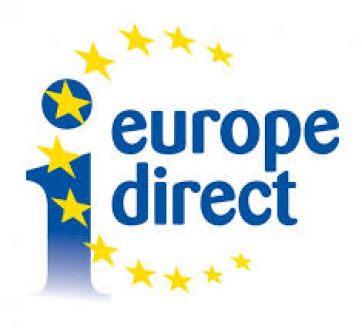
In person:
All over the European Union there are hundreds of Europe Direct information centres. You can find the address of the centre nearest you at: https://europa.eu/european-union/contact_enOn the phone or by email:
Europe Direct is a service that answers your questions about the European Union. You can contact this service:
by freephone: 00 800 6 7 8 9 10 11 (some operators may charge for these calls),
at the following standard number: +32 22999696 or
by email via: https://europa.eu/european-union/contact_en
EU publications
You can download or order free and priced EU publications here Multiple copies of free publications may be obtained by contacting Europe Direct or your local information centre

EU law and related documents
For access to legal information from the EU, including all EU law since 1952 in all the official language versions, go to EUR-Lex at:
http://eur-lex.europa.eu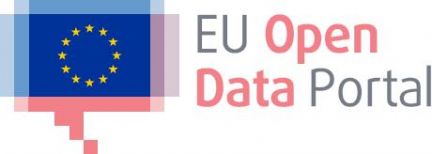
Open data from the EU
The EU Open Data Portal ( http://data.europa.eu/euodp/en)
provides access to datasets from the EU. Data can be downloaded and reused for free, for both commercial and non-commercial purposes.(1)(1)_w510_h196_1.png)
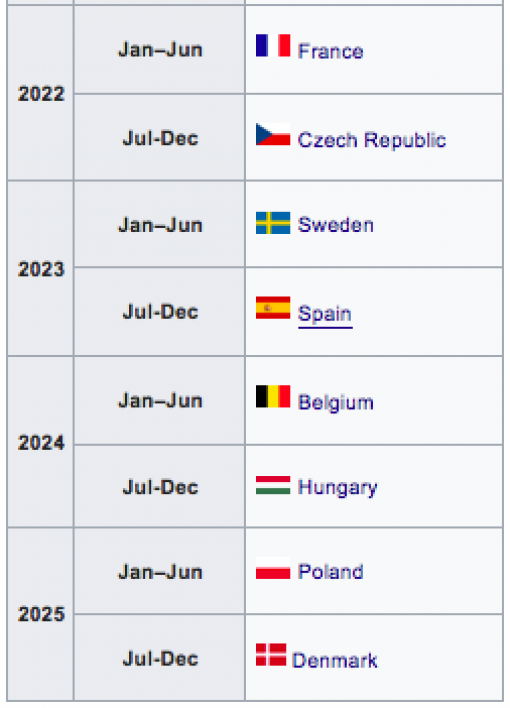
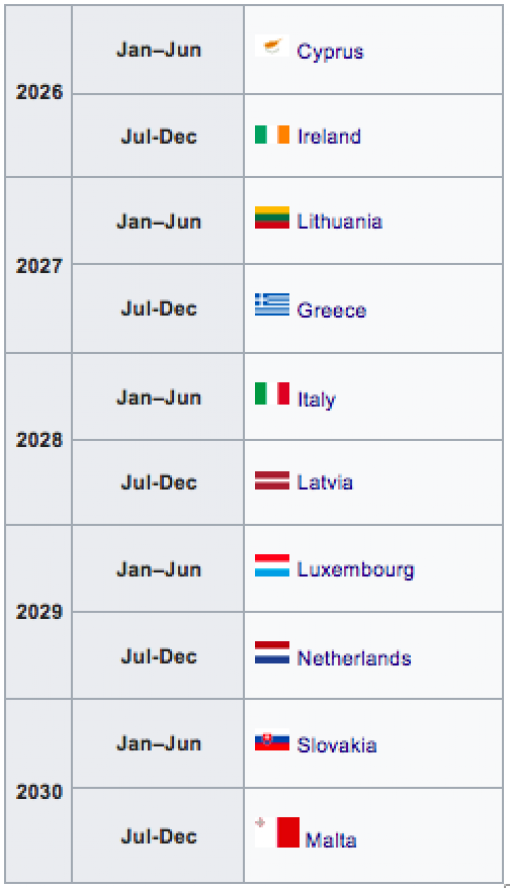
Back to top
_w328_h404_1.jpg)
_w476_h746_1.jpg)
_w460_h158_1.png)
(1)_w382_h470_1.jpg)

